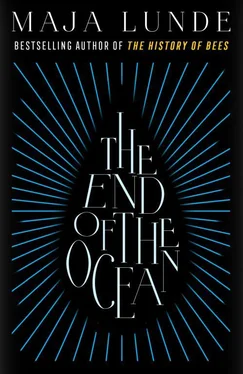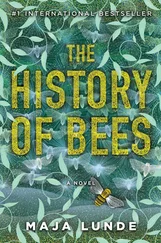*
We retrieve the ice and stack the containers outside his house.
“What should we do with it?” he asks.
“I don’t know,” I say.
He places a hand on one of them.
“The containers are nice. Hard, solid plastic.”
“Petroleum,” I say.
“What?”
“They’re made of petroleum.”
“And petroleum is made of plants.”
“The plastic isn’t biodegradable.”
“It won’t break down.”
“For thousands of years.”
We leave the containers outside, beside the wall of the house. We don’t open them.
*
I often go to check on Blue after breakfast, to take care of her; there’s always something, a mooring line that needs replacing, a fender that has slipped out of place, a boat beside her that’s too close and banging against the hull.
One day when I get back to the house, the containers are gone. I run out into the garden, but he’s not there, I spin around in circles, search everywhere and finally I spot him, far away, on top of a hill he calls a mountain, the highest point in the landscape.
I run into the densely wooded forest, making my way through the trees and the tall grass. Then I reach a path leading upwards. I am out of breath when I finally reach the top.
He is bent over the containers, but when I approach he turns around and smiles. “Here you go.”
He has stacked the containers on top of each other—two containers high, two wide, three long—and buried them halfway underground.
He thumps his hand on the container beside him, a slightly hollow sound, and at the same time I can hear the sound of the water inside.
“Don’t you want to sit down?” he says.
*
We can see far into the distance and the landscape is peaceful and well-tended, fields in all directions; nothing is out of place here, there are no aberrations, the house is down below, half hidden amidst the trees. We can see only parts of the red roof, the yard, the brook, we can glimpse the canal amidst all the greenery, a ribbon running through the landscape.
And we just sit there.
Two old people on a bench.
Ipulled the sheet over Lou, even though it was so hot that she didn’t need it.
Then I walked to the door.
“Good night, Lou.”
“’Night.”
She lay in silence, staring out into the darkness, into herself. And then, without looking at me, she asked:
“Daddy, are you going to do that… that thing… again tonight?”
“No,” I said. “No. We’re not.”
And I meant it. This evening we were just going to sit together, Marguerite and I. Because finally we had time.
Lou drew a breath, was about to ask about something, but seemed unable to find the words. I should talk to her about this, I thought. Should say something to help her to understand that it isn’t ugly. That it didn’t tear us apart, but instead united us.
But I couldn’t do this now. Because my mind was full of other thoughts. As was hers.
We’d carried the containers to the house. Twelve containers in all, of clean, clear water, vacuum-packed in plastic, sometime long ago. It took us twelve sweaty trips. Five for Marguerite, seven for me. While Lou ran back and forth between us, chattering excitedly.
The containers were in the middle of the living room.
We had locked the door this evening, for the first time since we moved in. We owned a treasure, twelve treasure chests. Enough water to enable us to survive for a long time. We would have to find food, but that we would manage. As long as we had water, everything was possible.
“Imagine if I wake up in the morning and they’re gone,” Lou said.
“They won’t be,” I said.
“But imagine?”
“We locked the door.”
“Are you sure?”
“Yes.”
“Did you check?”
“Yes.”
“Can you double-check, afterwards?”
“…Yes… fine.”
“Promise?”
“I promise.”
“Good.”
“Good night, Lou.”
“Daddy?”
“Yes?”
“I love water.”
“Me too.”
“Daddy?”
“Yes.”
“Can we play it one more time?”
“The rain game?”
“Yes, yes! The rain game.”
“Lou, it’s late.”
“Please?”
And it wasn’t hard to convince me. Because I loved this game too.
I went back into her room and sat on the edge of the bed. She lay quietly waiting, but I could see how tense her body was. Her eyes were wide open; she didn’t look the least bit tired.
“Start, then,” she said.
“Yes,” I said. “Close your eyes.”
She closed them.
“It’s morning and you’re in bed and asleep,” I said.
“I’m sleeping,” she said and snored loudly.
“It’s completely silent,” I said. “But then you hear sounds on the roof. It’s the sounds that wake you up.”
“No,” she said and opened her eyes. “There aren’t any sounds yet. Because it doesn’t start with real rain.”
“No, you’re right,” I said. “That’s how it was. It starts with drizzle.”
“And drizzle isn’t proper rain.”
“Drizzle just hangs in the air. Almost like fog.”
“And I wake up,” she said.
“You wake up all on your own,” I said. “Then you go downstairs to see me.”
“Because now you’re awake, too.”
She sat up in the bed.
“We go outside together. And Marguerite comes too,” Lou said.
“Outside we can feel how there is a drizzle in the air,” I said.
“Almost like fog.”
“We see how droplets of moisture form on the leaves.”
Lou turned her head towards the ceiling. “I think it’s raining, I say.”
“Yes, I say.”
“Then we sit down and wait.”
We sat side by side on the bed, both of us staring at the ceiling.
“Gradually it rains harder,” I said. “It gets stronger. The drops get bigger. And we can hear them.”
“We hear them,” Lou said.
“Do you remember the sound of rain?” I asked.
“Yes,” she said. She thought about it some more. “…No.”
I drummed my fingertips against the night table, a gentle tapping. “Like this.”
She nodded. “That’s how it was.” She lay her little hand down beside my own and drummed as well.
“A heavy downpour,” I said and made my fingertips hit the wooden tabletop harder. “The rain pours down harder and harder. The drops become larger and heavier.”
“They’re huge,” Lou said.
“It’s never quiet. It splashes. Gushes. Drips. Pours. The days pass. We fall asleep and wake up to the sound of rain on the rooftop. We have to raise our voices when we talk to drown out the noise of millions of drops constantly hitting the house, the ground, the trees.”
She curls up beside me.
“It’s pouring down,” I continue. “The rain connects everything. The air is full of water. And the canal changes. The drops hit the bottom, penetrating dry leaves, breaking up the hard soil.”
“And what are we going to do every morning?” she asked. “Say what we’re going to do every morning.”
“Every morning,” I say, “we run down to the canal. We stand on the bank and look at how much the water has risen in the course of the night. And we see what happens to the boat.”
“Yes?”
“Soon the water level reaches the hull. The keel is submerged. The water keeps rising. Until the boat is no longer aground. Till we have to moor it to the canal bank.”
“And I, like, catch hold of the line.”
“You catch the mooring line when I throw it and you tie it tightly to a big tree.”
“With a lot of knots.”
Читать дальше










